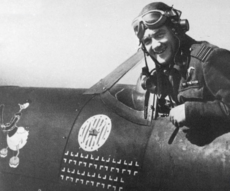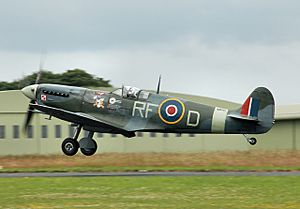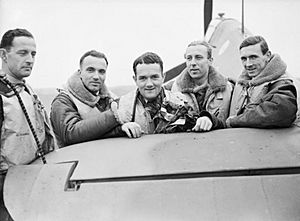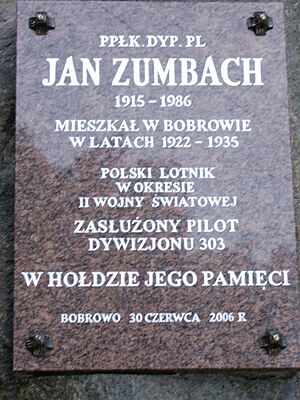Jan Zumbach facts for kids
Quick facts for kids
Jan Zumbach
|
|
|---|---|

Jan Zumbach, c. October 1940
|
|
| Born | 14 April 1915 Ursynów, Congress Poland, Russian Empire |
| Died | 3 January 1986 (aged 70) France |
| Allegiance | |
| Service/ |
|
| Years of service | 1934–1967 |
| Rank | Wing Commander |
| Service number | 1382 |
| Commands held | 303 Squadron (1942–1943) |
| Battles/wars |
|
| Awards |
|
Jan Zumbach (born April 14, 1915, died January 3, 1986) was a brave Polish-Swiss pilot. He was an amazing fighter pilot and leader during World War II. Later, he worked as a mercenary pilot in Africa. He helped create air forces for new countries like Katanga and Biafra.
Early Life and Training
Jan Zumbach was born in Ursynów, which was part of the Russian Empire at the time. His family were landowners from Poland. Jan was also a Swiss citizen because his grandfather was from Switzerland. He grew up in a place called Bobrowo.
In 1935, Jan finished high school in Płock. He then joined the Polish Army. After a year, he switched to the Polish Air Force. He trained to be an officer at the Polish Air Force University in Dęblin. By 1938, he was a pilot in the 111 Eskadra Myśliwska.
World War II Hero
Jan Zumbach could not fly during the German invasion of Poland in 1939. He had broken his leg in a flying accident. He later went to France and flew planes like the Morane 406. On June 10, 1940, his plane was shot down, but he was not hurt.
Soon after, he traveled to England. On August 2, 1940, he became one of the first members of the new No. 303 Polish Fighter Squadron. This squadron was made up of Polish pilots.
Battle of Britain Success
During the Battle of Britain, Jan Zumbach was very successful. He shot down eight enemy planes and probably one more. Most of these were German Messerschmitt Bf 109 fighters.
On May 9, 1941, Jan's plane was shot down over Dover. He was returning from a mission. Luckily, he was able to parachute out safely again.
Leading the Squadron
In December 1941, Jan Zumbach went to a training unit. In March 1942, he returned to 303 Squadron as a flight leader. By May, he was promoted to squadron leader. He took command of the squadron and led it from May 1942 until November 1943.

During this time, Jan flew three different Supermarine Spitfire planes. All his planes had the code RF-D. "RF" was the code for 303 Squadron, and "D" was for his specific plane. Each of his planes also had a cartoon of Donald Duck painted on the side. Jan marked his victories with German crosses under the cockpit. White crosses were for confirmed kills, red for probable kills, and outlines for damaged planes.
Final Missions and Capture
After leading 303 Squadron, Jan Zumbach worked in staff roles for a year. He then returned to flying as the commander of the 2nd Polish Air Wing. On September 25, 1944, he had his last victory of the war. He probably shot down a German Fw 190 plane over Arnhem.
On January 30, 1945, Jan was flying a small Auster plane to visit units. He made a mistake and ran out of fuel. He had to land in enemy territory. He spent the last month of the war as a prisoner of war.
By the end of the war, Jan Zumbach had shot down 12 enemy planes (and shared two more). He also probably shot down five planes and damaged one.
Life After the War
Jan Zumbach left the military in October 1946. But he kept flying planes to earn a living. He used a Swiss passport to fly goods that were not allowed (contraband) around Southern Europe and the Middle East.
Mercenary Pilot in Africa
In January 1962, Jan Zumbach was hired to create and lead the air force for Katanga. Katanga was a part of Congo that wanted to become its own country. He led their air force until December 1962.
After that, he bought and sold used airplanes. In 1967, he became a mercenary again. He organized and led the air force for Biafra, another region that wanted to be independent. He flew a B-26 Invader plane and used the name John Brown. He became very well-known in Biafra. He even took part in air raids, including one where he killed a Nigerian army chief of staff.
His Story in a Book
In 1975, Jan Zumbach wrote his life story. It was first published in French as Mister Brown: Aventures dans le ciel. Later, it was translated into German, English (called On Wings of War: My Life as a Pilot Adventurer), and Polish.
Jan Zumbach died on January 3, 1986, in France. The reasons for his death are not fully clear. He was buried in Powązki Military Cemetery in Warsaw, Poland.
Awards and Honors
Jan Zumbach received several important military awards for his bravery:
 Virtuti Militari, Silver Cross (This is a very important Polish military award.)
Virtuti Militari, Silver Cross (This is a very important Polish military award.)Cross of Valour (Poland), four times
 Distinguished Flying Cross (United Kingdom) & Bar
Distinguished Flying Cross (United Kingdom) & Bar
Images for kids
 | DeHart Hubbard |
 | Wilma Rudolph |
 | Jesse Owens |
 | Jackie Joyner-Kersee |
 | Major Taylor |




